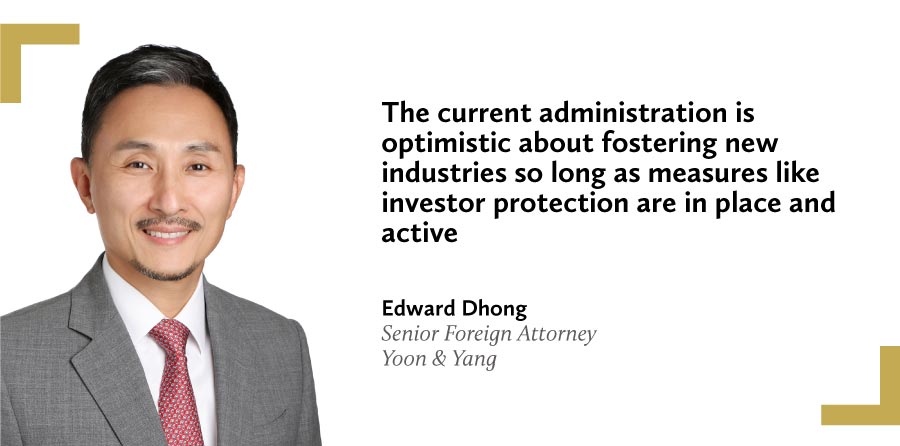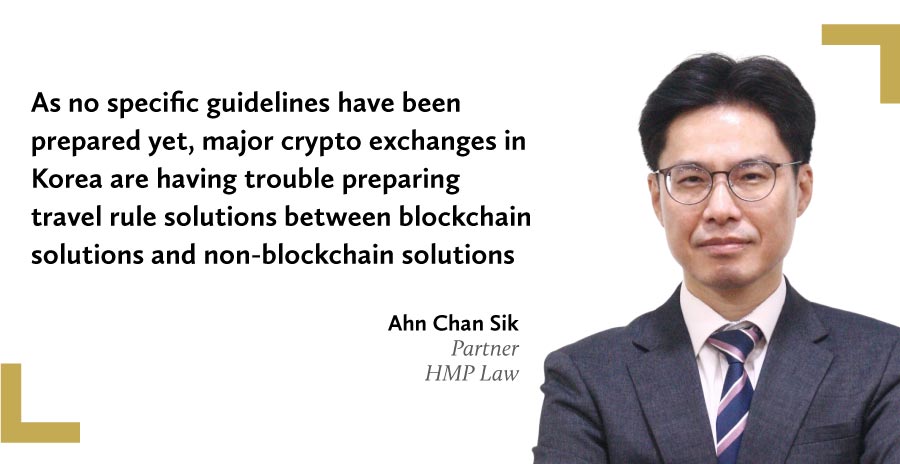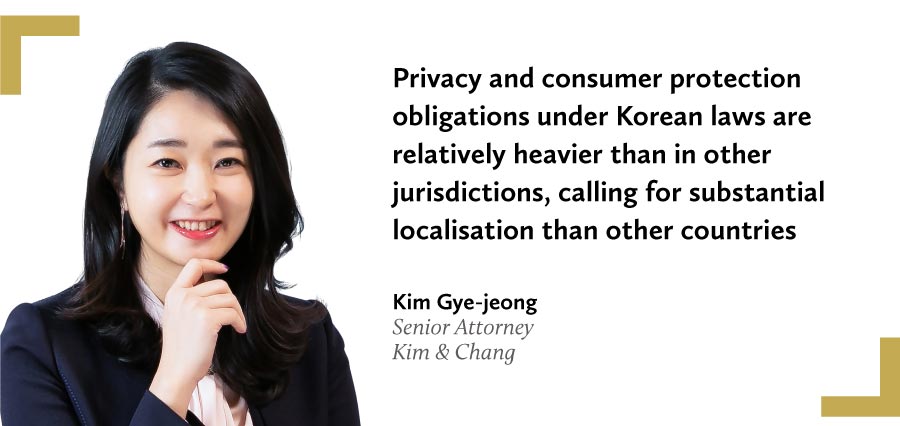After months of clamping down and chaos, South Korea is taking a hard look at how to create a safe space for cryptocurrency to flourish while safeguarding investors. Putro Harnowo reports
S
outh Korean President Yoon Suk-yeol took office in May, the same month as the stablecoin TerraUSD and associated cryptocurrency Luna crashed, wiping billions of dollars of investors’ money from the crypto market. For a crypto-friendly president who has pledged to implement a set of policies to open up Korea to blockchain innovation, it was a rough start.
The saga continued after prosecutors failed to locate and arrest Kwon Do-hyung, the South Korean co-founder and CEO of Singapore-based Terraform Labs, the parent of TerraUSD and Luna. Interpol in September issued a red notice for him. Korean authorities ordered “Do Kwon” – as he is best known – to return his passport by 19 October or have the document cancelled. At the time of publication, the 31-year-old was still on the run.
Do Kwon is not the only crypto problem that South Korea has had to deal with. Since late last year, the government has been cracking down on the virtual asset sector, with more than half of the crypto exchanges in the country forced to close after failing to secure licences from local regulatory agencies.
In September, the Korean authorities found USD7.2 billion of abnormal foreign exchange transactions, most of which were transferred through crypto exchanges since June. The same month, the Korea Financial Intelligence Unit, the country’s money laundering watchdog, flagged 16 crypto firms for operating without registration.
Signs of a turnaround came in late October, when the National Assembly and the Financial Services Commission (FSC) of Korea decided to prioritise legislation to safeguard investors in digital assets including cryptocurrencies, non-fungible tokens (NFTs) and others. The regulator and lawmakers aim to reinforce institutions to create a better balance between blockchain development, investor protection and market stability.

The need for protection has grown along with the popularity of virtual assets. The size of South Korea’s virtual asset market was estimated at KRW55 trillion (USD42 billion) at the end of 2021, according to the Financial Services Commission, with an average of KRW11.3 trillion in daily transactions made by around 15.25 million traders.
Despite the scale of crypto transactions, Dhong says the country lacks proper regulations and investor protection measures. For example, the government still maintains a ban on initial coin offerings (ICOs), suggesting that securities regulations may be applied to the virtual asset market.
“However, the current administration is optimistic about fostering new industries so long as measures like investor protection are in place and active,” says Dhong.
Ahn Chan Sik, a partner at HMP Law in Seoul, says that the South Korean government is not in favour of fostering industries that are prone to highly speculative activities and is deeply concerned about consumer protection issues around virtual assets. Regulators are especially sensitive to negative issues arising from virtual assets, such as fraud, illegal fundraising and hacking.

Korean regulations governing reporting by virtual asset service providers (VASPs), NFTs and decentralised exchanges are mainly based on guidelines issued by financial authorities such as the FSC and the Financial Supervisory Service, rather than laws, says Ahn. “Therefore, the government’s policy stance on virtual assets is deeply reflected in the regulatory process.”
Because of this, Ahn sees the virtual asset industry in South Korea evolving cautiously, and says virtual asset businesses are actively seeking legal advice on all aspects of their operation processes to avoid running into regulatory issues.
Chain reaction
Park Jongbaek, a partner at Bae Kim & Lee, says the damages sustained by crypto investors due to the TerraUSD and Luna fallout are not the only reasons behind the recent crypto winter. In January, the dramatic plunges in cryptocurrency Wemix and the shares of South Korean video game developer Wemade have highlighted the insufficient protection for Korean investors.
“Wemade, the issuer of Wemix tokens, accounted the sale proceeds of Wemix as the normal sales proceeds, and prices of Wemade shares and Wemix rose together,” says Park.
Later, Wemix announced it would be changing its treatment and booking sales of Wemix as debt, in accordance with advice from its accountants, sending Wemade shares and the value of Wemix sharply lower, he says.
Investors made criminal complaints against relevant persons at each company, says Park. “Negative perception of the public towards crypto assets accumulated with several incidents of hacking of exchanges, fraud, and illegal foreign exchange transactions,” he adds. “The Korean government’s positive regulation approach also could contribute to the current crypto crackdown.”
The crackdown included the strict implementation of the Anti-Money Laundering (AML) Act, which greatly reduced the trading volume of crypto exchanges. Many VASPs became more sensitive about the possibility that they might be subject to penalties for violating relevant regulations or criminal charges.
“The government, especially the FSC, has focused mainly on investor and user protection, and financial market stability, in regulating blockchain and virtual assets by prohibitive and restrictive policies,” says Park.
“Such measures relatively disregard innovative effects that the blockchain brings,” he adds, citing faster transactions, lower costs and greater financial inclusion.
From a wider perspective, Kim Gye-jeong, a senior attorney at Kim & Chang, sees the ongoing crypto as part of a global phenomenon stemming from not only the market’s instability but also the economy at a macroscopic level.
Kim adds that the prolonged uncertainty over the direction of the Korean regulatory regime has continued to challenge companies looking to enter or expand their operations in the Korean digital asset market.
“Companies also tend to consider the filing process and requirements to become a registered VASP under the AML Act to be burdensome, especially in this rapidly evolving industry,” says Kim. “Privacy and consumer protection obligations under Korean laws are relatively heavier than in other jurisdictions, calling for substantial localisation than other countries.”
 Stepping out of the minefield
Stepping out of the minefield
From a regulatory perspective, Dhong, of Yoon & Yang, explains that the biggest concern for VASPs entering the South Korean market is compliance with the Act on Reporting and Using Specified Financial Transaction Information (or Specified Financial Information Act), the backbone of the South Korean anti-AML system, which came into effect in March 2021.
“To conduct virtual asset services in accordance with the Specified Financial Information Act, VASPs must fulfil disclosure obligations, as well as the requirements that a VASP must observe in accordance with the AML and combating the financing of terrorism policy,” he says.
Dhong explains that VASPs must file a report to the commissioner of the Korea Financial Intelligence Unit, which is approved only when the following criteria have all been met: the VASP has obtained Information Security Management System certification; the VASP has entered into an agreement with a bank in South Korea that can issue real-name accounts; the representative and executive of the VASP are not in violation of any finance laws; and at least five years have elapsed since the cancellation of any previous report filed.
Previously, in 2017, the FSC announced that all types of ICOs, regardless of the associated technology or terminology, were banned. The regulatory authorities said that coin offerings were overly speculative and may violate capital market laws. This decision was largely interpreted as the government’s view that they increased the risk of financial fraud.
However, President Yoon and his administration are seeking to pass the Digital Asset Basic Act (DABA) to protect investors, while exempting tax on the profits from cryptocurrency of up to KRW50 million, says Dhong. “This new act is anticipated to encourage the inflow of funds and human resources into the cryptocurrency market in South Korea.”
To prepare the DABA, the Yoon administration established a public-private task force to begin the relevant discussion. Dhong says that the new act aims to minimise government intervention in the cryptocurrency market and increase the standard of the domestic market to the level of Switzerland, Hong Kong and Singapore.
Kim, of Kim & Chang, agrees that South Korea is in the middle of setting a regulatory framework for the crypto industry that is similar to other countries. The regulators and lawmakers are discussing the legal nature of various types of digital assets and how they should be treated.
“Striking the right balance among consumer protection, stability, innovation and flexibility would be the foremost goal,” says Kim. “Given the cross-border nature of this industry, multilateral co-operation should always come together.”
Among a number of bills before the National Assembly that seek to govern the digital asset industry as a whole, the ruling party-proposed Act to Restore Fairness in the Digital Asset Market and to Create a Safe Trading Environment focuses on user protection and prohibition of unfair dealings in the digital asset industry.
“As of today, there are no rules that are directly applicable to tokens other than virtual assets such as NFTs,” says Kim. “However, the financial regulatory authorities have indicated that existing laws and regulations such as the Financial Investment Services and Capital Markets Act (FSCMA) and the AML Act can be applied, depending on the nature of the concerned tokens.”
Ahn, of HMP Law, also sees that the DABA aims to establish a comprehensive regulatory system specific to virtual assets in consideration of the nature of virtual assets, and to foster and revitalise virtual asset businesses while establishing concrete measures to protect investors.
However, Ahn says that since the DABA is only at the proposal stage and it may be a long time before it becomes law, the FSC intends to regulate virtual assets through existing regulations such as the Capital Markets Act, the Electronic Financial Transactions Act and the Specific Financial Information Act, as well as guidelines.
One of the guidelines in the making, according to Chloe Lee, a partner at Lee & Ko in Seoul, is called the Guidelines on Security Tokens, which is expected to provide the criteria to classify certain digital tokens as securities, and the considerations and regulations to be applied to their issuance and related businesses.
You must be a
subscribersubscribersubscribersubscriber
to read this content, please
subscribesubscribesubscribesubscribe
today.
For group subscribers, please click here to access.
Interested in group subscription? Please contact us.





























